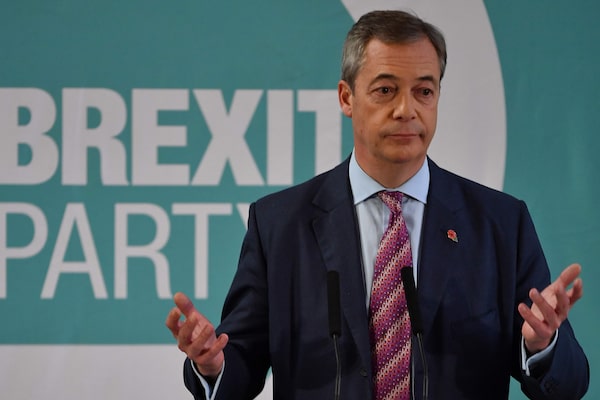
Mr. Farage has been under huge pressure from Brexit supporters not to run candidates in seats where there is a risk of splitting the Brexit vote.PAUL ELLIS/AFP/Getty Images
Brexit Party chief Nigel Farage changed course Monday, announcing that his party would not challenge Conservative candidates in nearly half of the U.K.’s districts, a tactical move that may make it easier for pro-Brexit forces to prevail in the Dec. 12 election.
Mr. Farage said his party will not put forward any candidates in 317 seats that the Conservatives won in the last election so as not to split the pro-Brexit vote. The move should boost the chances that Prime Minister Boris Johnson’s Conservatives win a majority in an early election that Mr. Johnson sought to increase his Brexit mandate.
A Conservative majority would likely mean that Mr. Johnson’s Brexit divorce deal would be passed by Parliament, clearing the way for Britain to leave the European Union at the end of January.
Mr. Farage said he was putting country before party by unilaterally forming a “leave alliance” with the Conservatives at the expense of parties seeking to slow or even stop Brexit. Those parties include the opposition Labour Party, the anti-Brexit Liberal Democrats and the Scottish National Party.
All 650 seats in the House of Commons are up for grabs in the Dec. 12 election, the first December vote in nearly 100 years. Right now the governing Conservatives have 298 seats and Labour has 243.
Mr. Farage has been under huge pressure from Brexit supporters not to run candidates in seats where there is a risk of splitting the Brexit vote.
“If we field 600 candidates, there will be a hung Parliament,” Mr. Farage said, warning that might well lead to another referendum on Britain’s EU membership that could cancel Brexit altogether.
“I think this announcement today prevents a second referendum from happening,” he said. “And that to me, I think right now, is the single most important thing in our country.”
After three years of negotiations and repeated delays, Britain is now scheduled to leave the EU on Jan. 31.
Monday’s move represented a substantial change in tactics, for only last week Mr. Farage had threatened to run against the Conservatives in every seat in England, Wales and Scotland unless they agreed to team up with his Brexit Party.
Mr. Johnson refused the offer, which included a demand that he drop his Brexit divorce deal.
Labour leader Jeremy Corbyn on Monday called Mr. Farage’s decision “a Trump alliance,” saying it reflected a desire to please U.S. President Donald Trump, who had pushed publicly for Mr. Farage and Mr. Johnson to unite in a pro-Brexit front.
“One week ago Donald Trump told Nigel Farage to make a pact with Boris Johnson,” Mr. Corbyn tweeted. “Today, Trump got his wish.”
Mr. Corbyn also claimed the “Trump alliance” would allow profit-driven U.S. drug companies to get a foothold in Britain’s beloved but financially stressed National Health Service – a constant theme of his campaign.
Over the weekend, several right-wing British newspapers urged Mr. Farage to change tack, saying there was a risk that Britain might not leave the EU if the Labour Party comes to power.
On the campaign trail, Mr. Johnson told reporters he was “glad that there’s a recognition” that only the Conservative party can get Brexit done. The prime minister said he had not discussed any election deal with Mr. Farage.
Earlier in the campaign, Mr. Farage had been strongly critical of Johnson’s EU divorce deal – claiming it didn’t count as a real Brexit – but he softened his tone Monday.
Mr. Farage said he had been encouraged by recent comments from Johnson that rule out extending the Brexit transition period beyond the end of 2020. He said the plan now is “to take the fight to Labour,” which he accused of betraying 5 million of its supporters who had voted to leave the EU in the 2016 Brexit referendum.
“The Conservative Party say they want Brexit, but have been taking that in a very questionable direction. But overnight the prime minister signalled a change of direction,” Mr. Farage said.
Mr. Farage made his announcement in Hartlepool, a former shipbuilding town in northeast England that has voted Labour for more than 50 years, but also voted strongly in 2016 to leave the EU. It is one of the Brexit Party’s top election targets.
While the Brexit Party favours a no-deal exit from the EU and the Conservatives back Mr. Johnson’s Brexit deal, Labour has vowed to renegotiate the EU divorce deal. Then Labour says it will hold a new referendum for British voters to decide whether to leave on those terms or remain in the single market of over half a billion people.
Businessman Richard Tice, the Brexit Party candidate in Hartlepool, denied that the party’s decision to halve the number of its candidates was a sign of weakness.
“We have made a unilateral, strategically important decision for the country,” he told The Associated Press.
Paul Beaumont, a Brexit Party supporter from the Hartlepool area, praised Mr. Farage’s decision.
“I thought it was a good solution to the situation we are in,” he said. “It allows us to ensure that we don’t have a second (Brexit) referendum.”
Our Morning Update and Evening Update newsletters are written by Globe editors, giving you a concise summary of the day’s most important headlines. Sign up today.